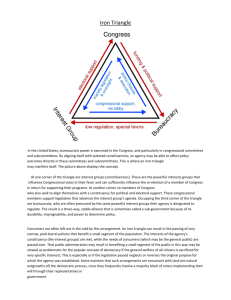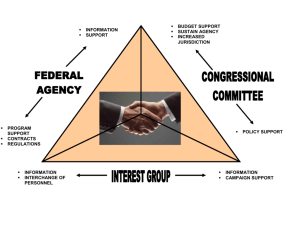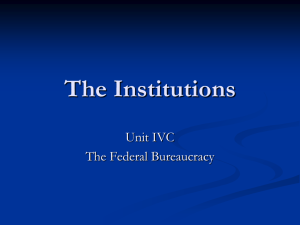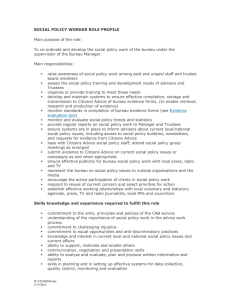Iron Triangle: Special Interests, Congress, & Bureaucracy
advertisement
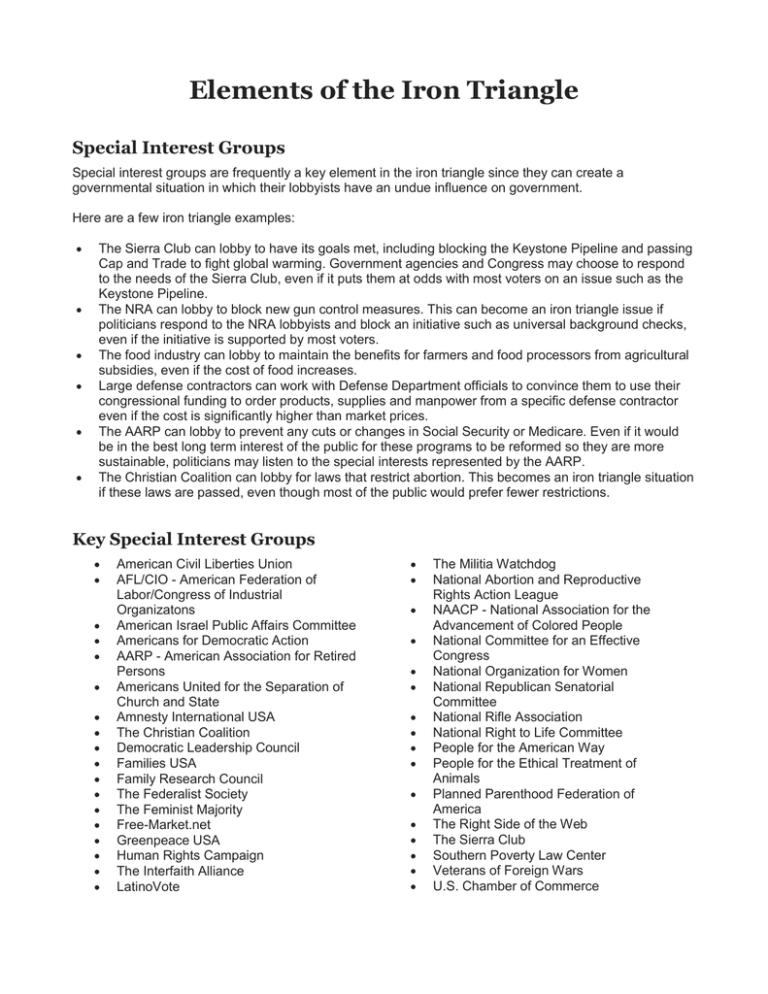
Elements of the Iron Triangle Special Interest Groups Special interest groups are frequently a key element in the iron triangle since they can create a governmental situation in which their lobbyists have an undue influence on government. Here are a few iron triangle examples: The Sierra Club can lobby to have its goals met, including blocking the Keystone Pipeline and passing Cap and Trade to fight global warming. Government agencies and Congress may choose to respond to the needs of the Sierra Club, even if it puts them at odds with most voters on an issue such as the Keystone Pipeline. The NRA can lobby to block new gun control measures. This can become an iron triangle issue if politicians respond to the NRA lobbyists and block an initiative such as universal background checks, even if the initiative is supported by most voters. The food industry can lobby to maintain the benefits for farmers and food processors from agricultural subsidies, even if the cost of food increases. Large defense contractors can work with Defense Department officials to convince them to use their congressional funding to order products, supplies and manpower from a specific defense contractor even if the cost is significantly higher than market prices. The AARP can lobby to prevent any cuts or changes in Social Security or Medicare. Even if it would be in the best long term interest of the public for these programs to be reformed so they are more sustainable, politicians may listen to the special interests represented by the AARP. The Christian Coalition can lobby for laws that restrict abortion. This becomes an iron triangle situation if these laws are passed, even though most of the public would prefer fewer restrictions. Key Special Interest Groups American Civil Liberties Union AFL/CIO - American Federation of Labor/Congress of Industrial Organizatons American Israel Public Affairs Committee Americans for Democratic Action AARP - American Association for Retired Persons Americans United for the Separation of Church and State Amnesty International USA The Christian Coalition Democratic Leadership Council Families USA Family Research Council The Federalist Society The Feminist Majority Free-Market.net Greenpeace USA Human Rights Campaign The Interfaith Alliance LatinoVote The Militia Watchdog National Abortion and Reproductive Rights Action League NAACP - National Association for the Advancement of Colored People National Committee for an Effective Congress National Organization for Women National Republican Senatorial Committee National Rifle Association National Right to Life Committee People for the American Way People for the Ethical Treatment of Animals Planned Parenthood Federation of America The Right Side of the Web The Sierra Club Southern Poverty Law Center Veterans of Foreign Wars U.S. Chamber of Commerce Congress Another corner of the iron triangle is Congress. Congress exchanges "friendly legislation" to interest groups as well as bureaucrats and governmental agencies in order to get their support in elections. As a result: Bureaucrats and agencies receive less oversight and gain the ability to more freely execute policy. Special interest groups, bureaucrats and agencies receive special favors and lowered regulation. Individuals within Congress often forge these alliances with special interest groups and bureaucrats as a source of information. They select the groups they align with based on the subject matters discussed in their assigned committees. For example, a congressperson from the Midwest who is a member of the Agriculture committee in the House of Representatives may rely on a lobbyist from the ethanol industry to provide industry stats and facts about the benefits of using corn for ethanol production. As long as the congressperson works towards policies that are beneficial to ethanol production, the lobbyist may, in turn, be very influential in promoting the congressperson as an ally to the corn farmers. This could raise the congressperson's chances of reelection. Committees in the House of Representatives Agriculture Appropriations Armed Services Budget Education and the Workforce Energy and Commerce Ethics Financial Services Foreign Affairs Homeland Security House Administration Intelligence (Permanent Select) Judiciary Natural Resources Oversight and Government Reform Rules Science, Space, and Technology Small Business Transportation and Infrastructure Veterans' Affairs Ways and Means Health, Education, Labor, and Pensions Homeland Security and Governmental Affairs Indian Affairs Intelligence (Select) Judiciary Rules and Administration Small Business and Entrepreneurship Veterans' Affairs Committees in the Senate Aging (Special) Agriculture, Nutrition and Forestry Appropriations Armed Services Banking, Housing, and Urban Affairs Budget Commerce, Science and Transportation Energy and Natural Resources Ethics (Select) Environment and Public Works Finance Foreign Relations Joint committees of the House and Senate Economic Library Printing Taxation Bureaucracies and Government Agencies The third side of the iron triangle are the government bureaucracies and agencies that function as the implementation arm of policies and procedures passed by Congress. Congress is their key source of funding. This synergistic effect can lead to decisions being implemented that may be in the favor of Congress or the agency, but not in the best interests of the citizens. For example, Amtrak can convince Congress to reduce some of the regulations on train safety as a way to cut costs, even though the changes could be detrimental to the future safety of the train riders. Key Bureacracies and Government Agencies Alcohol and Tobacco Tax and Trade Bureau Alcohol, Tobacco, Firearms, and Explosives Bureau American Battle Monuments Commission AmeriCorps Amtrak Animal and Plant Health Inspection Service Antitrust Division Appalachian Regional Commission Architect of the Capitol Archives (National Archives and Records Administration) Arctic Research Commission Bureau of Consumer Financial Protection Bureau of Economic Analysis (BEA) Bureau of Engraving and Printing Bureau of Indian Affairs (BIA) Bureau of Industry and Security Bureau of International Labor Affairs Bureau of Justice Statistics Bureau of Labor Statistics Bureau of Land Management (BLM) Bureau of Prisons Bureau of Reclamation Bureau of the Census Bureau of the Public Debt Bureau of Transportation Statistics Fair Housing and Equal Opportunity (FHEO) Farm Credit System Insurance Corporation Farm Service Agency Mediation and Concitiation Service, Office of Medicaid and CHIP Payment and Access Commission Medicare Payment Advisory Commission Merit Systems Protection Board Migratory Bird Conservation Commission Military Postal Service Agency Mine Safety and Health Administration Minority Business Development Agency Mint Radio Free Europe/Radio Liberty (RFE/RL) Refugee Resettlement, Office of Regulatory Information Service Center Research and Innovative Technology Administration Risk Management Agency (Agriculture Department) Rural Business and Cooperative Programs Rural Development Rural Housing Service Rural Utilities Service The iron triangle that these three groups (special interest groups, Congress and government bureaucracies and agencies) has created is strong because of their reliance on each other to achieve their own agendas. Often, the consequence of this relationship is legislation that overspends and results in the waste of taxpayer dollars and the ignorance of needs of citizens. Iron Triangle 1. What are the 3 corners of the Iron Triangle? a. b. c. 2. The iron triangle represents situations where ___________________ groups have undue influence on govt. 3. In the examples, which 3 do you think concerns Americans the most? a. b. c. 4. In this scenario, Congress is accused of passing friendly legislation in exchange for _______________. 5. It states that Congress forges these alliances as a source of _______________________________. 6. Name 5 Special Interest Groups that you have heard of a. d. b e. c 7. (Your Homework) Find one Iron Triangle influence that is NOT listed above as an example and explain how the lobby is changing or affecting policy. _____________________________________________________________________________________ _____________________________________________________________________________________ _____________________________________________________________________________________ _____________________________________________________________________________________ _____________________________________________________________________________________ _____________________________________________________________________________________
